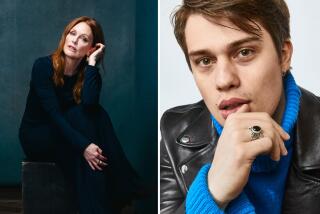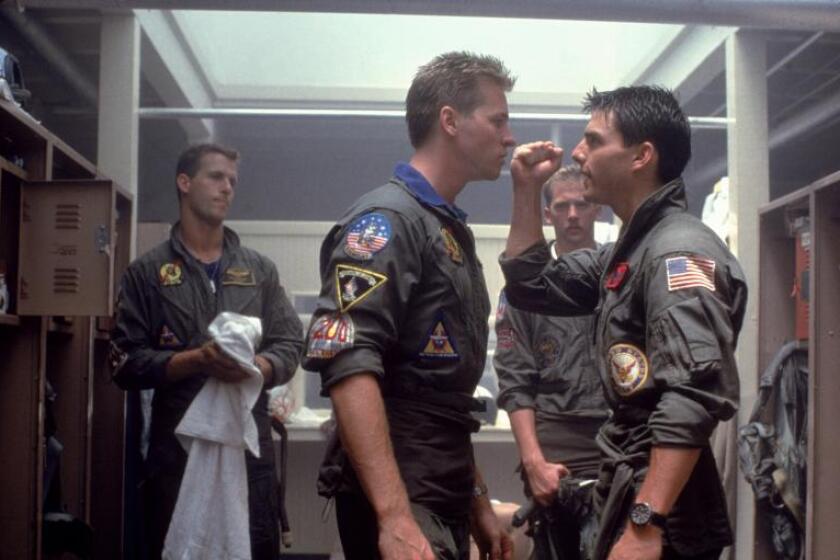MOVIE REVIEW : ‘Glory’: Kids Run Free in the Blitz
- Share via
To movie-going Americans, World War II in England was the noble sacrifice of “Mrs. Miniver,” the no-nonsense heroics of “In Which We Serve,” the dogged, self-effacing bravery of Humphrey Jennings’ fireman in “Fires Were Started.”
In his brilliantly evocative and warmly comic “Hope and Glory” (selected theaters), John Boorman shifts the point of view downward, away from the tense and preoccupied adults, to that of a sweetly thoughtful 7-year-old boy, to whom the war is something else entirely.
It’s still bomb shelters and gas masks and even random death, shockingly close at hand. But the rubble of young Bill Rohan’s comfortable middle-class London suburb also makes the greatest playground imaginable--two-story houses cross-sectioned nakedly to the world, their radios and teapots and medicine cabinets intact. To these kids, war is true liberation in its most glorious and frightening form, and Boorman, who wrote, produced and directed this rich, semi-autobiographical reminiscence, is aware of its every contradictory nuance.
The war will split up families, strengthening some, shattering others. With their husbands away, it will require wives such as Grace Rohan (Sarah Miles) and her closest friend Molly (Susan Wooldridge) to do the inconceivable, to take “men’s” jobs and “men’s” responsibilities, some of which they will never relinquish.
It will thrust a randy, headstrong 15-year-old like Grace’s daughter, Dawn (Sammi David), into an early bloom, like a forced hothouse plant. And for the husbands and fathers, Clive Rohan (David Hayman) and his best friend Mac (Derrick O’Connor), who is Molly’s husband, the war will be the dream of military glory and the reality of an Army clerk-typist’s job.
The two youngest Rohans, 7-year-old Bill and 5-year-old Sue (the splendid Sebastian Rice Edwards and the enchanting Geraldine Muir), very nearly miss the war altogether. At Waterloo Station, listed and tagged like so many small, somber parcels, they are about to join hundreds of young evacuees when Grace pitches a monumental fit. Safe or not, they are hers, and she will not be parted from them.
And so they are plunged into life on the home front, where the only constant is school, wretched school. School means the nines tables, even during an air raid, snorted in unison by the children through their gas masks. It is their bearded headmaster, leading prayers “for the affliction of Herr Hitler.” And it is the definitively British explanation of Why We Fight, given to Bill by his chapped and ferocious teacher. “What do all the pink bits on the map of the world mean?” she asks. “Ours,” Bill replies. “Ours,” she says, proprietarily. “The British Empire. That’s what men are fighting and dying for--to save all the pink bits for you ungrateful little twerps.” George Bernard Shaw could not have put it with more savor.
We begin to see the war in a totally other light; as early bombs drop some little distance away, we understand Dawn, capering in their fireworks-glow, in defiance of the blackout. When one of the protective barrage balloons breaks its mooring and sails overhead, the men are earnest about bringing it down like some rogue elephant, the women laugh softly between themselves as they admire its preposterous size. “They’re lovely when they’re full,” Molly sighs, “and it’s so sad when they sag.”
Boorman catches the breakdown that the war is beginning to create in Bill’s rigidly stratified neighborhood. Unlikely that he would be playing with the boys whose gang he is allowed to join--but for the war. What the bombs have left undamaged is fair game for these boys, even Bill, whom Boorman casts in a slightly more sensitive mold than the rest. When they somehow coax 12-year-old Pauline (who looks as though she’d grow into Charlotte Rampling) into a quick round of look-see, it’s only Bill who declines the honor.
At home he has the mystifying female psyche to contend with on every side. Surrounded by sisters, smothered by aunts (named, no less, Faith, Hope and Charity), witness to the skirmishes between Dawn and Grace over the 15-year-old’s crush on a visiting Canadian soldier, these sudden heats and passions confuse and embarrass Bill as deeply as his mother’s outburst at Waterloo Station.
To the audience, however, it’s part of “Hope and Glory’s” rollicking sensuality. (The film is MPAA-rated PG-13.) Under the heat lamps of war, it flowers in most un-British fashion, from Grace’s father, Grandfather George, and his yearly toast--in the presence of his wife and all his daughters--to the fleshly delights of every lady of his experience, to 5-year-old Sue, who has perhaps the most precise theory on sex of all of them.
It’s at Grandfather George and Grandma’s white wooden cottage, on the Thames at Shepperton, that the film’s final and most seductive section takes place. There Grace and her goslings, joined intermittently by Clive, must take refuge when their house is gone. Under Philippe Rousselot’s lenses, this is one of the most enticing places imaginable, redolent of “Wind in the Willows” and “messing about in boats.” Yet Boorman does not get soppy-sentimental about the old patriarch, played by the fiercely magnificent Ian Bannen. He remains an irascible billy goat, impossible to housebreak, much less tame.
Each one of “Hope and Glory’s” cast is faultless, but it would seem incorrect not to single out Miles and Wooldridge, Davis and finally Rice Edwards, on whose slim shoulders so much of the film’s credibility rests.
At the very close, as his grandfather drives the boy to school past a camera crew, “Strapping fellows playing silly buggers with a war on!” and Bill’s head is almost pulled off his shoulders trying to watch them, you know where it all began for Boorman. But you also know where his fascination for women began too, and he has given their tensile strength, their tenacity--and England’s--an irresistible salute.
‘HOPE AND GLORY’
A Columbia Pictures presentation in association with Nelson Entertainment and Goldcrest of a John Boorman film. Executive producers Jake Eberts, Edgar F. Gross. Writer, producer, director Boorman. Co-producer Michael Dryhurst. Camera Philippe Rousselot. Production design Anthony Pratt. Costumes Shirley Russell. Editor Ian Crafford. Sound editor Ron David. Original music composed, arranged, conducted by Peter Martin. Special effects designer Phil Stokes. Art director Don Dossett. Set decorator Joan Wollard. With Sarah Miles, David Hayman, Sammi Davis, Sebastian Rice Edwards, Derrick O’Connor, Susan Wooldridge, Jean-Marc Barr, Ian Bannen, Annie Keon, Jill Baker, Amelda Brown, Katrine Boorman, Colin Higgins.
Running time: 1 hour, 53 minutes.
MPAA-rated: PG-13 (special guidance for attendance of children under 13).
More to Read
Only good movies
Get the Indie Focus newsletter, Mark Olsen's weekly guide to the world of cinema.
You may occasionally receive promotional content from the Los Angeles Times.










